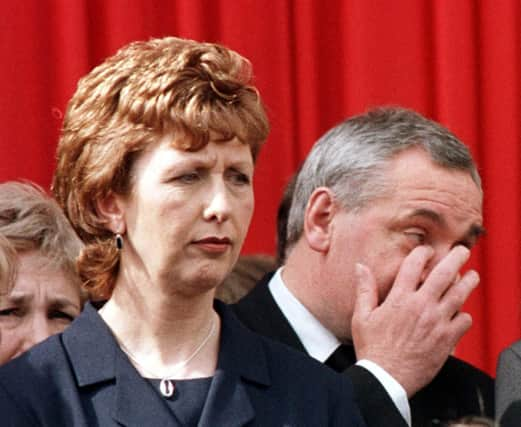Irish state papers: British official had concerns about Mary McAleese at Omagh event without Queen


Twenty-nine people, including a woman pregnant with twins, were killed when a car bomb exploded in the Co Tyrone town in 1998.
It was the worst loss of life in a single incident in Northern Ireland’s troubled past, and came just months after the historic Belfast/Good Friday Agreement.
Advertisement
Hide AdAdvertisement
Hide AdA memorial service in honour of the victims was planned a week after the bombing.
On August 21 1998, the day before the event, Irish Embassy official Philip McDonagh was called to the Foreign Office to discuss Irish premier Bertie Ahern and president Mary McAleese’s attendance.
A note sent from the London embassy to Ireland’s Department of Foreign Affairs suggested that George Fergusson, the head of the Ireland department within the UK’s Foreign Office, had gently encouraged the country not to send such senior representatives to the ceremony.
He suggested that a formal memorial service would be announced “within less than 24 hours” that would be attended by the British monarch and then-UK prime minister Tony Blair, which would allow the taoiseach and president to withdraw from the first event despite having confirmed their attendance.
Advertisement
Hide AdAdvertisement
Hide AdMr Fergusson appeared to suggest that locals were against “high level” attendance at the memorial.
Mr McDonagh replied that based on soundings they had taken, the “contrary” was the case, and said that Mr Ahern’s and Mrs McAleese’s plans had already been announced, and “substantive” meetings were likely to take place around the visit.
Mr Fergusson then said that Mr Blair and the Queen could face “embarrassment” by not attending, to which Mr McDonagh replied they had received “nothing but praise for their gestures of sympathy”.
He added that he could not see British figures “attracting criticism on grounds of protocol”.
Advertisement
Hide AdAdvertisement
Hide AdMr Fergusson then admitted he was more concerned about the Queen’s absence rather than the prime minister.
He said it was not practical to send a senior royal to Omagh as it could “detract from the ceremony itself”, and said if a “less prominent member” were sent it could appear “inadequate if President McAleese is present”.
He suggested a “compromise”, where Mr Ahern would attend but Mrs McAleese would not, to which Mr McDonagh said he was “uncomfortable” with the use of the word “compromise in a matter of this kind”, which Mr Fergusson accepted.
In a comment on the correspondence sent to Ireland’s Department of Foreign Affairs, Mr McDonagh added that he felt Mr Fergusson implied that the taoiseach’s attendance was “in some sense in the gift of the British government”.
Mr McDonagh said that he was “deliberately not taking this point”.
Mrs McAleese and Mr Ahern attended the memorial service the following day.